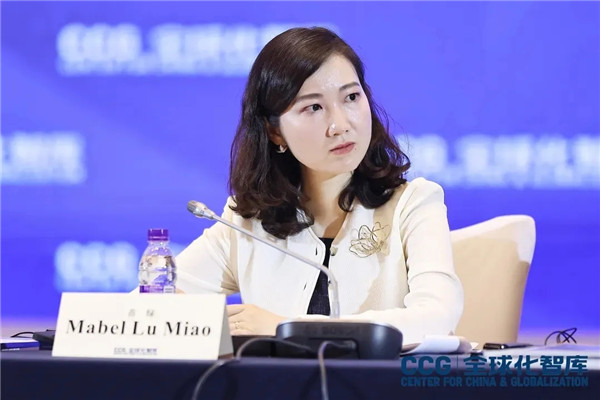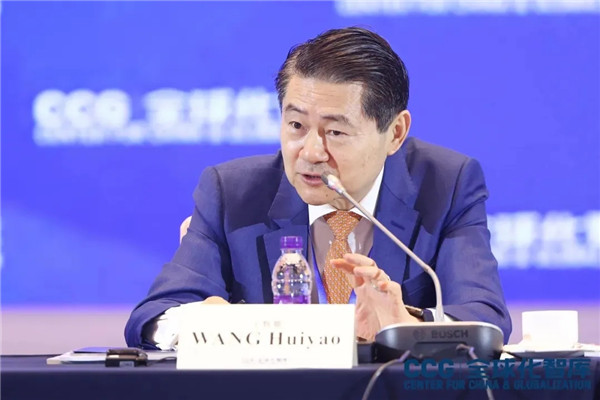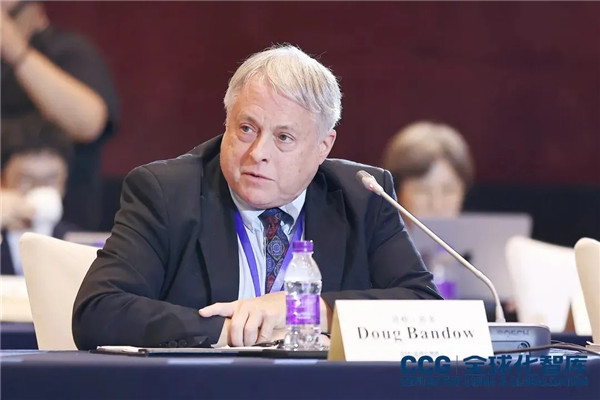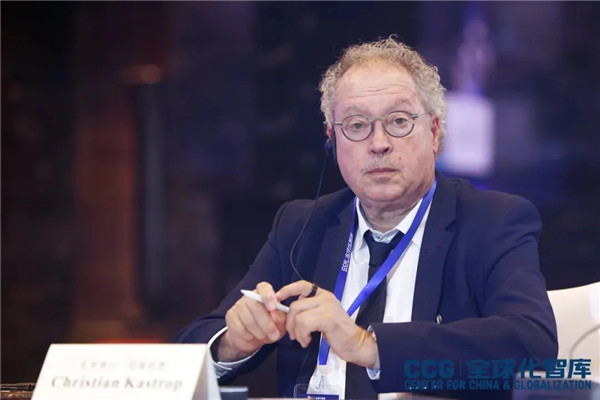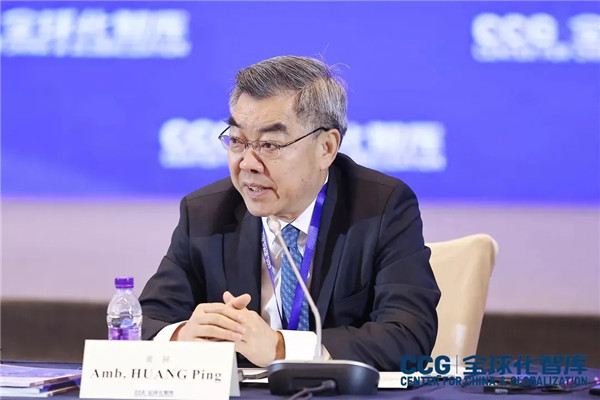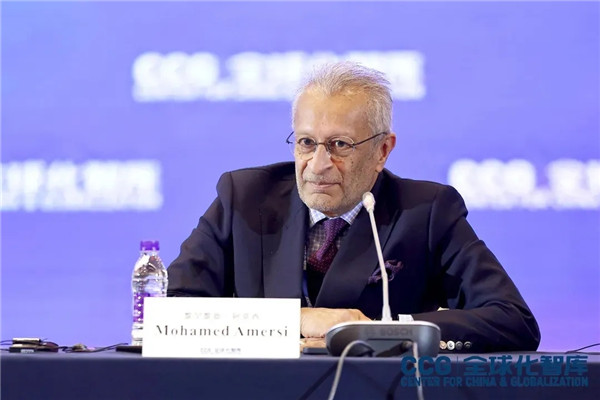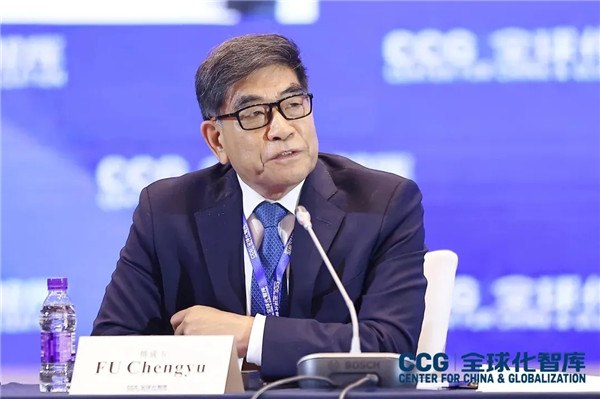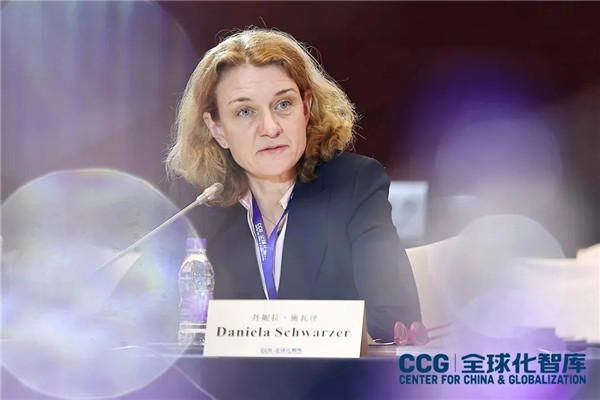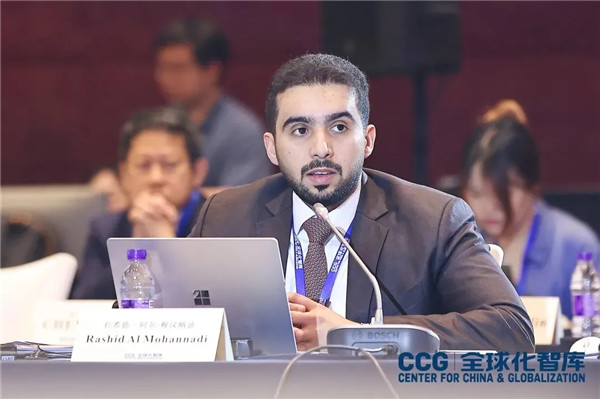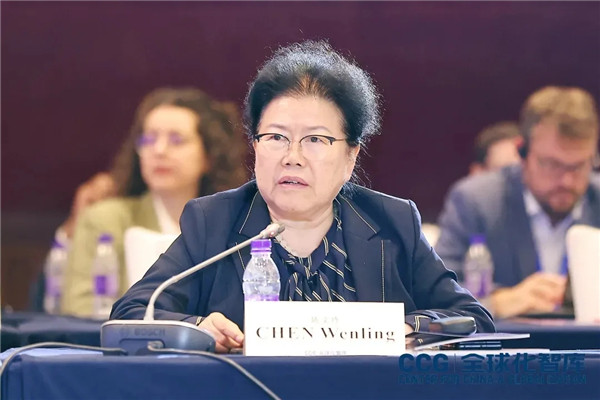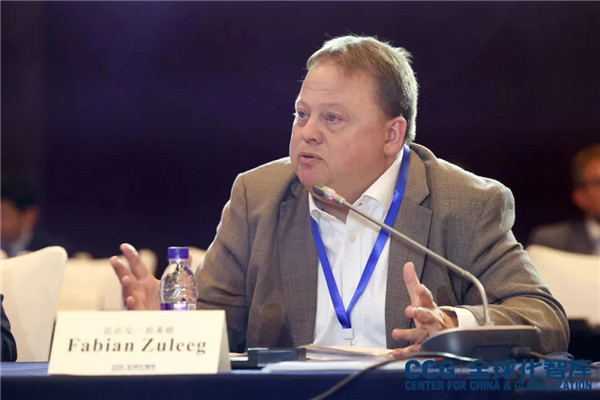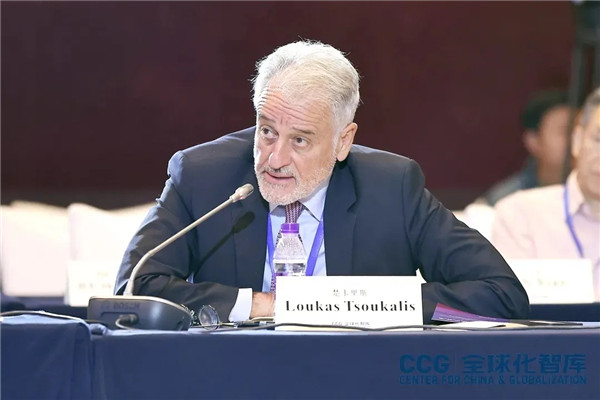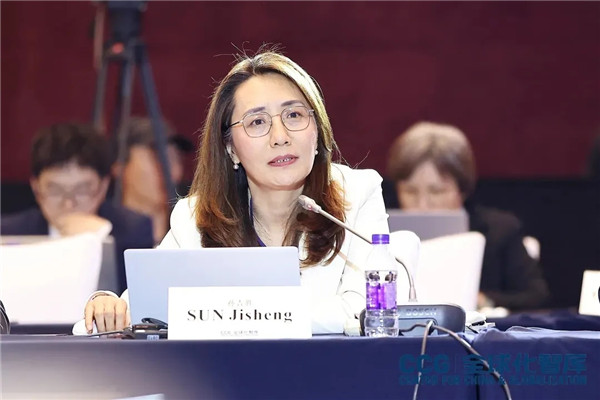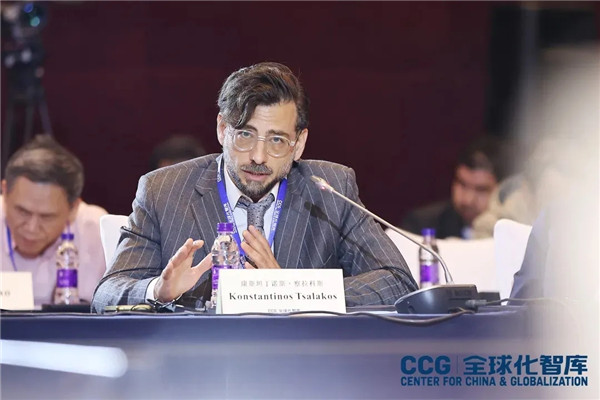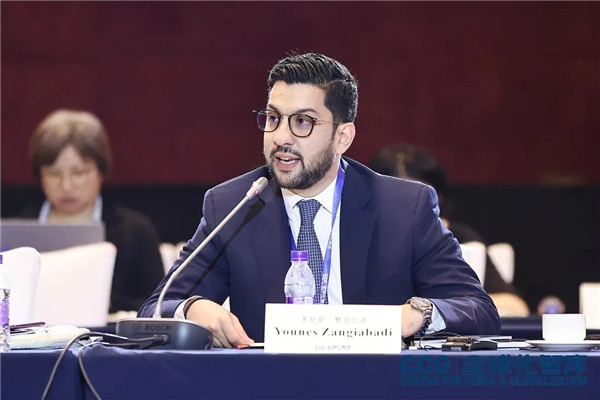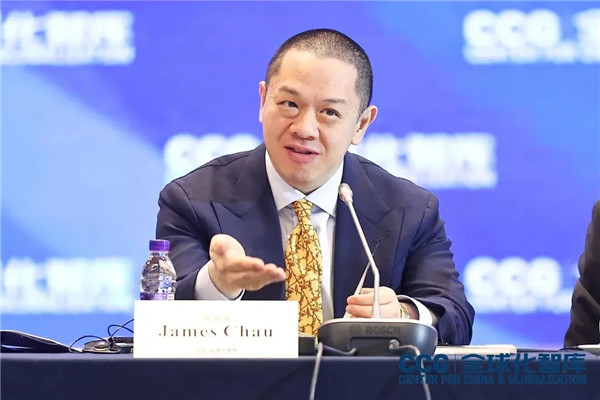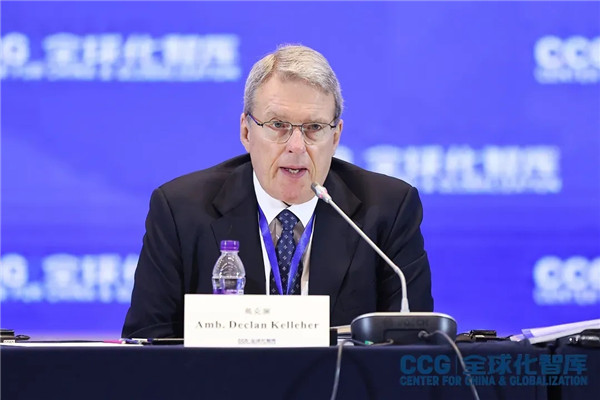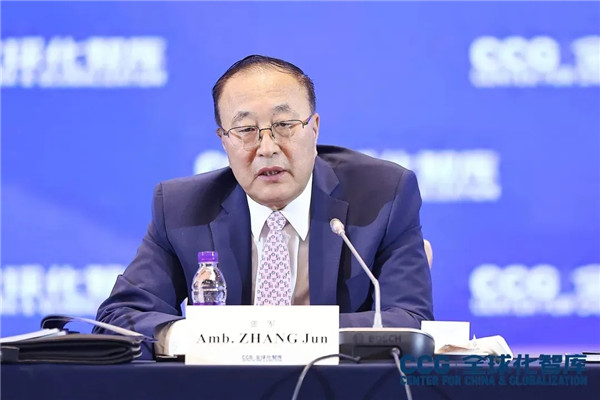Opening roundtable of the 11th China and Globalisation Forum
June 05 , 2025Renewing Global Governance & Multilateralism in Uncertain Times
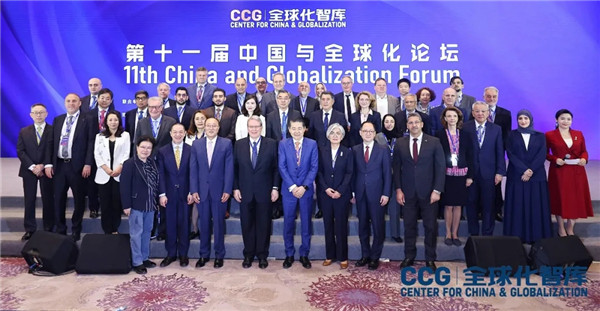
The 11th Annual China and Globalization Forum, jointly convened by the Center for China and Globalization (CCG) and the Chinese People’s Association for Friendship with Foreign Countries (CPAFFC), and co-organised by the Academy of Contemporary China and World Studies (ACCWS) and the China-United States Exchange Foundation (CUSEF), concluded successfully in Beijing after a three-day agenda from May 22 to 24.
Having published the transcript of the opening session, below is the transcript of the forum’s opening roundtable themed “Renewing Global Governance and Multilateralism in Uncertain Times.”
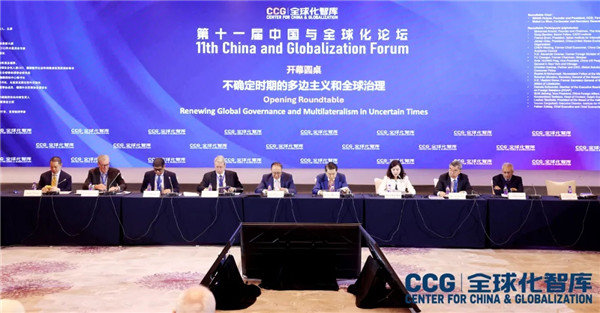
The session was co-chaired by”:
Henry Huiyao WANG, Founder and President, CCG; Former Counselor to China State Council
Mabel Lu MIAO, Co-founder and Secretary General, CCG
▲Video | Opening Roundtable: Renewing Global Governance and Multilateralism in Uncertain Times
Contributors included:
Doug Bandow, Senior Fellow, CATO Institute
Christian Kastrop, Partner and CEO, Global Solutions Initiative; Former German State Secretary for Digital Society and Consumer Policy
HUANG Ping, Vice President, China-US People’s Friendship Association (CUSPFA); Former Chinese Consul -General in New York and Chicago
Mohamed Amersi, Founder and Chairman, The Amersi Foundation
Alexander Downer, Former Foreign Minister of Australia
FU Chengyu, Former Chairman, Sinopec
Daniela Schwarzer, Member of the Executive Board of Bertelsmann Stiftung; Former Director and CEO of German Council on Foreign Relations (DGAP)
Franco Bruni, President, Italian Institute for International Political Studies (ISPI)
Rashid Al Mohannadi, Nonresident Fellow at the Middle East Council on Global Affairs
CHEN Wenling, Former Chief Economist, China Centre for International Economic Exchanges (CCIEE); Expert, CCG Academic Council
Fabian Zuleeg, Chief Executive and Chief Economist, European Policy Centre (EPC)
Loukas Tsoukalis, President of the Board of the Hellenic Foundation for European and Foreign Policy (ELIAMEP)
SUN Jisheng, Vice President, China Foreign Affairs University (CFAU)
Konstantinos Tsalakos, Head of Content, Delphi Economic Forum
Youness Zangiabadi, Executive Director, Institute for Peace & Diplomacy (IPD), Canada
with additional remarks from speakers at the opening session:
James Chau, President, China-United States Exchange Foundation (CUSEF); Goodwill Ambassador, World Health Organisation
Declan Kelleher, Chair, Governing Board, European Policy Centre; Former Irish Ambassador to China
ZHANG Jun, Secretary General, Boao Forum for Asia; Former Permanent Representative of China to the UN
The transcript is based on the video recording and has not been reviewed by any of the speakers.
Opening Roundtable
Mabel Lu MIAO, Co-founder and Secretary General, Center for China and Globalisation (CCG)
Good morning, everyone. Welcome to the opening roundtable of the 11th annual forum of China and Globalisation. I’m Mabel Lu Miao, Secretary General and Co-founder of CCG. It’s my great pleasure to co-chair this roundtable alongside with Dr. Henry Huiyao Wang. Our discussion today centres on a crucial and timely theme—”Renewing Global Governance and Multilateralism in Uncertain Times”.
In the face of escalating geopolitical tensions, growing economic fragmentation, and the surge in unilateral and nationalist policies, the very foundations of international cooperation are being severely tested. Traditional multilateral institutions and frameworks are challenged by rising mistrust—we mentioned it just now in the opening remarks—competing narratives, and increasing political polarisations. Our aim today is to draw on the diverse expertise of distinguished participants to identify practical paths for reinvigorating multilateralism and fostering a more cooperative, equitable, and resilient global order.
We are honoured to have with us a distinguished group of participants: former ministers, diplomats, leading experts, and thought leaders, of course, who bring diverse perspectives and deep experience in global governance. We kindly ask everyone to keep your interactions concise in the limited time to allow for rich exchange and smooth flow. With that, let me invite Dr. Henry Huiyao Wang to share your remarks as a co-chair. First, I would like to hand over to you to moderate the rest of the panel. Thank you.
Henry Huiyao WANG, Founder and President, Center for China and Globalisation (CCG)
Thank you, Dr. Miao, and thank all the roundtable participants this morning. This is really a very important roundtable. It’s the opening roundtable session. As we all know, we’re having this roundtable dedicated to the topic “Renewing Global Governance and Multilateralism in Uncertain Times.” We have gathered experts from around the world, representing almost all the continents. In an era marked by geopolitical tensions, economic fragmentation, and rising political polarisation, the imperative to renew global governance has never been greater. The resurgence of unilateralism and nationalistic agendas is testing the resilience and relevance of multilateral cooperation.
As the world grapples with overlapping crises in multilateral trade, security, climate change, public health, digital governance, AI, and particularly peace and war that we are really facing in our time, how can nations rebuild trust in multilateral frameworks? What reforms are needed to ensure global governance structures remain relevant and inclusive? How can major players like China, the US, the EU, and, of course, Global South countries continue toward a more stable and cooperative order? I think this is really a very timely issue that we are discussing today, and we are so pleased to have such a distinguished panel join us. Also, I’m very pleased to report that Ambassador Zhang Jun, the Secretary General of the Boao Forum and also the former Assistant Minister of Foreign Affairs, is also with us at this roundtable and has lots of experience as well.
We’ll start this roundtable. Basically, the question we would like to have is: What implications does the second Trump administration bring to the world in terms of trade, global institutions, and multilateralism? How can we work together to overcome those uncertain times? And how can China, the EU, and, of course, the Global South collaborate in a more constructive manner in rising uncertain unilateralism and forced reforms for the key international institutions?
For example, just recently, two days ago, China announced it is going to support the WHO with 500 million U.S. dollars, and the Chinese Vice Premier announced that in Geneva. That’s one of the actions that China is taking to support those international organisations. So, what are the new models of inclusive multilateralism that can address the pressing global challenges, such as climate change, which we haven’t really talked much about in the last several months, and AI, public health, and digital governance?
To really conclude the question: in a multipolar world, where does the multilateral system exist? And with competing narratives, how can we really build up consensus? How can the global governance framework ensure legitimacy, equality, and effectiveness without falling into paralysis? Lots of questions.
I’m going to chair this. Maybe we’ll start with hearing some U.S. views first. I would like to invite Doug Bandow, Senior Fellow from the CATO Institute and also a participant in this conference, to share your view first. Doug, please.
Doug Bandow, Senior Fellow, CATO Institute
Well, it’s a great pleasure to be joining the conference again, and certainly to start off the discussion is one that I appreciate. We obviously are gathered at challenging times. What we see out of Washington really is a challenge to the established order in many forms of organisations and relationships. The challenges created by that are obvious: a loss of stability, of certainty, the potential even for the overthrow of established relationships and institutions.
But it is a moment we can also grasp as one of opportunity. That is, this is a moment to challenge and reconsider institutions that have grown old. The United Nations and Bretton Woods institutions are 80 years old. NATO was created 76 years ago. These are institutions which persist at times despite the great changes in the international environment.
So, let me suggest that we use this opportunity to reconsider and to think about alternatives. One option, of course, is to try to update old institutions, but there may be an opportunity to create new institutions, to bypass those that have ceased to work and which seem paralysed to inaction. And there also may be opportunities to move to regional institutions and other civil society institutions to address the kind of problems that we have.
I believe that the best balance to unilateralism is to find alternative solutions of many kinds, not just one, and not just view ourselves as limited to what we have had in the past, but to think creatively about what the future might hold for us and how to transcend the past.
First, I think it requires all countries and civil institutions to be prepared to act, and not to wait for any particular country, particularly one that is in the throes of the governmental change we see in Washington, to act. I think other countries have got to be prepared to provide resources and recognise those resources might not be forthcoming from Washington, not only because of the Trump administration, but America’s finances. I will not bore you with the details of American finances, but leave it to be said: the United States’ financial system and financial situation is not good. And we see an argument in Washington right now over these issues. Others need to be prepared to step up and be prepared to move, even if established countries are not interested.
And my hope is that in the future we can see that there is more than what once was called “the essential nation”—that in fact, all countries are essential, that all peoples are essential; and that through civil society institutions and new governmental institutions, we can act out those people and those institutions and solve the problems that we have. The question is looking at trying to use new technologies, for example, which are transforming our world. I am someone who grew up reading newspapers. Today, we have a very, very different conception of how to transmit news, how to communicate with one another. We can use those to try to deal with the problems of the future.
We have new constituencies—a global youth movement that again offers extraordinary opportunities and challenges, who have grown up with a very different set of assumptions and views of what is possible. We need to find ways to reach needy constituencies, many who in the past have been seen as beyond our reach. I think, for example, of Palestinians suffering in Gaza—of how we can reach those who seem beyond our reach because of where they are situated or the governments that control them. We have to find ways to be able to move beyond.
We also need to find new solutions. These are ones for which I don’t have a good set of solutions to offer for this gathering. But I think this, again, let us view what we have before us as a challenge, not just a problem. And it’s a challenge that, if we grab on to it and succeed in addressing it, we may very well find ourselves much better off in the future and ultimately be pleased that we were challenged, as opposed to [being] allowed to rely upon failed solutions from the past. Thank you.
Henry Huiyao WANG
Thank you, Doug, for your very stimulating point from a U.S. think tank point of view, which we have to really tackle all these issues together.
I’d like to hear a European voice—perhaps Christian Kastrop. You are the Partner and the CEO of the Global Solutions Initiative, former German State Secretary for Digital Society and Consumer Policy. I know you have just successfully organised the Global Solutions Summit in Berlin just recently, and we’d like to hear from you. Christian, please.
Christian Kastrop, Partner and CEO, Global Solutions Initiative; Former German State Secretary for Digital Society and Consumer Policy
Thank you very much, Henry, for this nice introduction, and a big thank you also for having this great conference here. Indeed—”Houston, we have a problem.” That was a famous saying pointing to the U.S. And, of course, we are all aware that the US, against quite a lot of economic knowledge and experience, started a kind of new mercantilist approach, which could create quite a burden on other related economic issues. Economic history tells us that this concept has never worked, only temporarily, also in Germany at an ancient time. So, if we start that, I still see there is a risk that everybody will lose in the long run, and it will diminish growth nearly everywhere.
This is, of course, most important to what is dear to our global solutions issues. It will also entirely affect the Global South, which is still in need of its own development and is still lacking the necessary support. And this has also to be done through trade and, more important issues, technological exchange and really building up their own industry in the Global South—not just being the prolonged workbase for the Global North.
All this, in spite of the fact that we still have huge ecological challenges around—we have degradation, especially in the Amazon and other regions of the world—and this is also to be taken into account.
So, as unilateralism is by and large on the rise, coalitions of the willing, of progressive and pro-global organisations and governments, should really get together and combat this very dangerous degradation of multilateralism and the governance system we have established in the last 80 years since Bretton Woods.
There is a special and renewed case, of course, for cooperation—to reload a new global structure. But we need also rather more intense and better cooperation between partners, and I would indeed highlight here the EU, China, Asia, and the Global South. Of course, this partnership should be open to other global partners as well.
It’s also true that even in this group, including the EU, with which I worked for quite a while, there will exist differences on specific issues. But all these should be by far outweighed by strengthened cooperation on all those issues which really need to be tackled immediately.
So, I still believe there is a lot of common ground for cooperation between these partners, even beyond some existing differences. So, let’s create a bloc of those who are willing to support true global solutions with respect to global problems, the survival of our ecosystems, and, of course, our economies—and humanity as such in the future.
The next generation should not make us responsible for having seen the sign of the times but did not act forcefully enough. So, multilateralism must be renewed and strengthened wherever possible—of course, also including the U.S. And we need more stringent and more global governance with a fair share for the Global South, creating their own economic and industrial development, as said at the beginning.
That’s what I wanted to tell you. We will have the next Global Solutions Summit in Berlin next year on the 11 and 12 of May, and I may announce this at the end of my intervention. Thanks so much.
Henry Huiyao WANG
Thank you, Christian. Excellent. I think the Global Solutions Initiative is very important, particularly in challenging times like ours. We lack global solutions, particularly joint global solutions. So, conferences like this are really to build up consensus, to see how we can make more global solutions to the challenges we are facing today. Thank you for coming and also for proposing these great ideas.
And now I would also like to have a Chinese representative. I would like to invite Ambassador Hang Ping. He was also the Consul-General of the People’s Republic of China to New York for six years, and he just got back. Perhaps you can share some of your views as well. Ambassador Huang, please.
HUANG Ping, Vice President, China-US People’s Friendship Association (CUSPFA); Former Chinese Consul -General in New York and Chicago
Well, thank you so much. I served in the U.S. three times. I served as a Consul General in Chicago and New York. I just came back.
Obviously, globalisation has created lots of wealth, but the distribution is not very good. Lots of people are not benefiting from that. That’s why lots of people in the U.S. are not happy.
When I was the Consul-General in Chicago, my consular district covered most of the states in the Midwest, and I travelled to states like Michigan, like Wisconsin, all around the Great Lakes. When I was in New York, Ohio was one of the states falling into my consular district, so I’ve been there many times. That’s the so-called Rust Belt. You would see lots of abandoned factories and people living in that area—I don’t think most of them benefited from globalisation. That’s why they were not happy, and they wanted the industry back to the U.S. That’s why they supported President Trump.
If we compare—I came from Guizhou Province. I was born and grew up there in China. That was the poorest region or area in China. But now things have changed a lot because China put lots of attention and the central government helped that area to develop. If you go to Guizhou these days, you will see a very different province and region there.
Common wealth is the most important thing. While you are gaining wealth and creating wealth, you have to make sure of the distribution. I think the reason China has kept its stability and development at the same time is because we not only concentrate on our development, but also the distribution of wealth. That is so important. We lifted like 800 million people out of poverty. So people support this government. China maintained its stability, and that guaranteed its further development.
Nowadays, globalisation is still developing. But who is going to guarantee, while we are creating more wealth, we can still distribute that wealth in fair ways? I also served as Ambassador to Zimbabwe. I’ve travelled to lots of countries where people are still struggling. Who is going to step up and guarantee they can also benefit from future globalisation?
I don’t have a solution, but one thing is very important: major countries need to play a key role—like China and the U.S. So, you are not just going to point fingers and say, “It’s your fault.” We need to get united, working and joining hands in the same direction. [We need to] shoulder the responsibility to help all countries in this world to develop together. That’s all I want to say. Thank you.
Henry Huiyao WANG
Thank you, Ambassador Huang. Yes, great point. You have lived through the changing times in China. You mentioned your province, Guizhou. It’s, of course, now one of the fastest-growing provinces in China, although it was relatively backwards in the past. Also, you see this going on in the last six years in New York. You see this changing dynamic. Certainly, we need to work together to safeguard the benefits of mankind and development. Of course, we can continue to improve, so thank you again.
Now I’d like to invite Mohamed Amersi, the Founder and Chairman of the Amersi Foundation. I know you’ve come from the Middle East region and are very active internationally. I’d like to hear from you also. Mohamed, please.
Mohamed Amersi, Founder and Chairman, The Amersi Foundation
Thank you very much, Henry and Mabel, to have me here again. It’s a pleasure to be here as a privileged partner of CCG, as well as a member of its advisory council. Let me start by apologising for some of my colleagues—Milica Pejanovic, Ana Palacio, and one or two other people—that had schedule conflicts and had to come and go to their meetings. They should soon, I hope, be coming back.
Today, I may indulge your patience and time, Henry, for a little longer than permitted because I wanted to pay tribute by dedicating my remarks to a dear friend who passed away a few weeks back. I’m referring to Professor Joseph Nye, a grand figure of American political science and the coiner of the phrase “soft power.” At a time when hard power and coercion as means of statecraft are making a comeback, his compassion and intellectual rigour will be greatly missed in this world.
Soft power, as you know, is the ability to affect others through attraction rather than coercion. Its consequences are slow and often indirect, and it is not the most important source of power for foreign policy. But to neglect it is a strategic and analytical mistake.
The Roman Empire rested not only on its legions but also on the allure of Roman culture and citizenship. As a Norwegian analyst friend of mine described it, the U.S. presence in Western Europe after the Second World War was an empire by invitation and not by force. At the end of the Cold War, the Berlin Wall collapsed not under a barrage of artillery but from hammers wielded by people whose minds had been affected by Western soft power. And today, as is evident, hard power alone will not help resolve the conflicts in Gaza and Ukraine.
Smart political leaders have long understood the power that can come from values. If I can persuade you to want to do what I want you to do, then I do not have to force you to do what you do not want to do. If a country represents values that others find attractive, it can economise on sticks and carrots. Attraction can always then be used to increase hard power.
When I met him earlier in the year, Joseph Nye lamented that Donald Trump clearly did not understand the power of U.S. soft power and had severely undercut it. He was also in no doubt that China valued soft power and stood ready to fill the vacuum that the Trump administration had created. However, while it is easy today to say that Trump is destroying soft power, and it is still too early to calculate his level of damage to the American brand, it is also important to note—firstly, as my other friend Professor Huntington, in his epic book The Clash of Civilisations and the Remaking of World Order in the early 90s, said—that although people around the world might dress and even sound American, that does not necessarily make them pro-American. The 9/11 hijackers wore blue jeans, drank Coke, and may have enjoyed the occasional Hollywood blockbuster, but that didn’t lessen their hatred for America.
Secondly, Trump has his own soft power. Nowhere is this better illustrated than his recent escapade to the Persian Gulf. And I call it Persian—or to use the Trump phrase—the Gulf of Iran. For a moment, it looked as if it might be relabelled Arabian Gulf, but sanity prevailed, and it didn’t happen. Trump’s interlocutors see him as the kind of American with whom they can do business. No moral tutorials, no lectures on values, just business and just deals. The feeling is clearly reciprocal. A joke that went viral last week was that Trump might be mixing up Gulf with golf, but the oil-rich Arab monarch states seem to like it—Trump’s 18-hole golf courses and the gilded branding on it.
Thirdly, for Trump and his comrades, including President Putin—and I use the word comrade deliberately—soft power is too soft and impossible to tangibly measure. But that does not and should not invalidate the goal. Joseph Nye said to me that he found it ironical that so many countries, including China, had asked his advice on how to make use of their own soft power. We both remarked that while the U.S. was busy downsizing the State Department, withdrawing humanitarian and emergency aid from the world’s neediest, and downsizing its diplomatic outreach in the Global South, China was busy filling this vacuum. The world’s consumers may not know or care where their American jeans are made—mostly in China—but they know who comes to their aid when they need help, be it financial, political, or social.
It may help to reflect that a country’s soft power comes primarily from three sources: its culture, when it’s attractive to others; its political values, such as democracy and human rights, when it lives up to them; and its policies, when they are seen as legitimate. How a government behaves at home—for example, protecting a free press and the right to protest, in international institutions, i.e. consulting others and multilateralism, and in foreign policy by promoting development and human rights, can affect others by the influence of example. As they say, charity always begins at home.
So what’s the future like for hard and soft powers? In my view, there is a one-word answer: that it will not be hard power or soft power, but a new hybrid which I would like to label technopower. Power will be in the hands of a fast-evolving technopolar world, where tech actors—be they state or private, wielding state-like powers—will be making decisions without any legitimate mandate.
In this new technopolar world, we will see the emergence of this new hybrid power, with a focus on cloud systems, cybersecurity platforms, data centres, and satellites. Although it’s early days still, the preliminary results are that an increasingly technopolar United States, where a handful of tech leaders enjoy extraordinary power with the implicit or explicit backing of the U.S. Government, may need to compete with perhaps a somewhat tightly state-controlled Chinese technology apparatus, where tech titans may—and I emphasise may—need to serve political goals.
In this new paradigm, the key questions will be whether technology epitomises existing soft power values and principles, or will we need to invent new ones. If the latter, what will they be? Some of these new techno-utopians from the United States—Peter Thiel, Elon Musk—have grown ideologically hostile to democracy, as they believe that freedom and democracy are simply incompatible. Caught between these two poles will be the rest of the world. Europe aspires to digital sovereignty but lacks the homegrown tech muscle to pull it off. Much of the Global South is being pulled towards one model or the other based on how this model is presented and received, and global institutions that might once have brokered a balance are being sidelined or dismantled.
And here’s the kicker: though the U.S. and Chinese systems may differ in ideology, they are starting to converge in practice when it comes to values. Both appear to prioritise power, efficiency, and control over and above consent, accountability, and freedom. Therein lies the paradox of this newly evolving technopolar age. Technologies that were supposed to democratise access to power, information, and opportunity will now enable more effective forms of unaccountable control. We have a classic situation of a tail wagging the dog: control the platform, then design the narrative; fake or false values are meaningless, as they will be presented as the truth and accepted as such. Thank you very much.
Henry Huiyao WANG
Thank you, Mohamed. Yes, I agree with you that we should pay tribute to Joseph Nye, who was also a great friend of CCG. In fact, two years ago, he came to this forum in Beijing, hosted by CCG, and I wrote a tribute article for him that was published in Pekingnology and the CCG Update just two weeks ago. We had many dialogues with him, and he actually entrusted us to edit a book for him titled Soft Power and Great-Power Competition. You can scan that book for free using the QR code in the booklet for this conference. So again, absolutely—we are seeing too much hard power being built in today’s world, while soft power is diminishing. It’s extremely important that we enhance the soft power of all nations. So, thank you again.
Now I’d like to invite His Excellency Alexander Downer, the former Foreign Minister of Australia, to share your view. I know you are one of the longest-serving foreign Ministers in Australia, and we are very pleased to have you here. We’d love to hear from you.
Alexander Downer, Former Foreign Minister of Australia
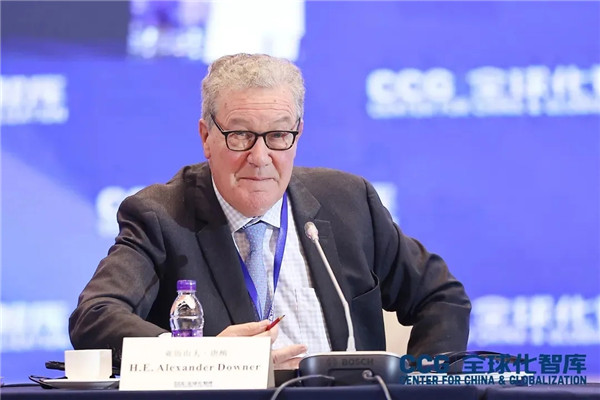
Thanks very much, and thank you for having me at the forum. I found the discussion absolutely fascinating up until now. I agree with some of it, and I don’t agree with some of it as well.
Let me just say something about multilateralism and multilateral institutions, because I think it’s fair to say they are failing at the moment. They are performing very poorly. This is partly a function of the rise of nationalism. And of course, that’s not just in the United States. Let’s not single out the Trump administration the whole time. This is also true in many other parts, particularly of the developed world, which has been the leader of globalisation, of the process of globalisation. So there has been a retreat in the developed world from globalisation, and that is a function of the rise of nationalism. And as others have said, this is partly as a result of the reaction from the so-called losers of globalisation. That is one of the issues.
To be frank, the other really big issue in developed countries is the phenomenon of illegal immigration. And it’s not the migrants who in and of themselves are the problem, but the fact that the immigration in such big numbers is illegal—is contrary to the law—and the sense in many developed countries—and this is not true of my own country, by the way, but in many developed countries—where the government and the people have no say in who comes to live in their country. And that obviously has led to a reaction, and that’s led to the entrenchment of nationalist sentiments, which, as we have all agreed, I think so far, is regrettable.
And this translates into a weakness of international organisations. So when I think of the United Nations Security Council, it has been spectacularly unsuccessful in stopping the wars that we see before us. I mean, how has the United Nations been able to stop the war in Ukraine? The United Nations has played almost no role when it comes to Gaza. The United Nations resolutions have been passed from time to time, but the United Nations hasn’t been able to bring that conflict to an end in Sudan. And so the list goes on. I am somebody who worked for six years for the United Nations, so I’m very sorry to see this. But to be brutally honest about it, the United Nations has not been successful. The United Nations did not broker a ceasefire between Pakistan and India recently. Many have claimed they did broker that ceasefire. The Indians and the Pakistanis did the ceasefire, but the United Nations was not involved.
So there needs to be consideration given to reform of the United Nations, and I have argued for many years that the permanent membership of the Security Council needs to be expanded. You know, China doesn’t agree to Japan being a permanent member of the Security Council, yet Japan is the fourth biggest economy in the world. Japan should be a permanent member of the Security Council. India, Brazil—they should be as well. Nigeria, perhaps, as the most populous country in Africa. Would you give those countries a veto? No, I wouldn’t. I wouldn’t expand the veto. But I think to have a bigger permanent membership rather than the top-heavy, Western-dominated membership—I mean, China and Russia are part of it as well—I think is disproportionate.
And very quickly, in my last minute, I want to say one other thing, and that is to talk about global trade. You know, since President Trump’s outrageous tariff policy—I’ve always been opposed to tariffs—I welcome all the countries and the governments that have come out now and said they’re for free trade, including this country, the People’s Republic of China. Hooray. I never thought I’d live to see the day. Suddenly, China, which imposed a huge range of sanctions on my country in 2020—suddenly, China is the champion of free trade. Long may that last. Long may that last. And as a champion of free trade, I think China should reduce its tariffs, reduce its level of protection, open up the Chinese economy to more investment, and that will be warmly reciprocated through the Indo-Pacific region and beyond. You know, the way to outmanoeuvre Trump and the outrageous American tariff policy is to become yourselves a champion of free trade and unilaterally start to dismantle protection.
And by the way, the European Union has suddenly become a great champion of free trade and like China. I think this is wonderful. We have not been able to negotiate a free trade agreement with the European Union because of European protectionism of their agriculture. We have had to abandon the negotiations. Let’s resume the negotiations now that we’re all anti-Trump and all pro-free trade. I think this is a wonderful development. And China, being the second biggest economy in the world, should take the lead here. I know what you’re thinking. You’re thinking I’m being naughty. Well, think about it. Don’t just criticise the Americans. Think about your own protectionist policies and reflect on them. Thank you.
Henry Huiyao WANG
Great. Thank you, Alexander. Well, many of the words were well said. Actually, you see, this time when the U.S. launched the constant escalation of tariffs and trade war, China probably is the only country that stood out against that trade unilateralism in front of the world. I mean, basically, I was at the UN Security Council Arria-formula meeting last month in New York—80 countries participated. I spoke there, and I said we really need to maintain this multilateral trading system.
China is doing a lot now. For example, China just this year announced they’re giving 43 least developed countries zero tax to come to China—unilaterally, you know, unilateral for free trade. China is making a lot of progress. And also, China and Australia are making a lot of progress. Australia is now more collaborative. We have a free trade agreement with Australia, and so I hope that this political and economic good relationship will continue to set a good example. And then China wants to join CPTPP, and Australia is part of that. We hope we can expand RCEP and CPTPP together. Thank you, Alexander.
Now I’d like to have President Fu Chengyu. He was the chairman of Sinopec and a well-known industrialist. He used to run a Fortune 500 company in China for many years and is well-known in China. So we’d like to hear from you. You, in the past, often appeared in Davos and on many world stages. We’d like to hear from you as one of the industry representatives from China.
FU Chengyu, Former Chairman, Sinopec
Well, thank you, Mr. Wang, for inviting me to join this roundtable discussion, which is a very important, especially on the topics of the US-China relations and the Donald Trump 2.0. This is a very important topic. Especially, most of the Chinese pay much attention to what is going on and what will develop in the next few years between the U.S. and China. So, my following comments are mainly to communicate with the Chinese. Certainly, for those of you who are not from this country, when you hear my comments, don’t look at them from the angle of right or wrong, or good or bad, but only from the angle that this is one of the ideas from a common Chinese citizen. That’s why I would like to conduct my comments in Chinese. For those of you who don’t speak Chinese, please use your headphones. So, let me start my observations, especially talking about China-U.S. relations, and the Trump 2.0 administration. It’s related to climate change issues.
[Speaking in Chinese]
Today, people have become accustomed to frequent occurrences of extreme weather events such as droughts, floods, tsunamis, and wildfires. We refer to these as extreme climate events. But in fact, these are only individual manifestations. The driving force behind them lies in long-term, far-reaching climate change. If we fail to take action to mitigate climate change, it will pose an immense threat to the future survival of humanity. This is why the United Nations and governments around the world have mobilised to implement various proactive measures in response to climate change, culminating in the ambitious Paris Agreement reached in 2015.
Now, when we talk about the “Trump phenomenon,” should we treat it as a series of isolated events or examine it as a global, long-term development—something akin to climate change? Clearly, the Trump phenomenon is not unique to the United States; similar movements are evident in many other developed countries. It is, in essence, a phenomenon on the scale of climate change—broadly prevalent and long-lasting. As such, it also poses serious risks and disruptions to the development of human society. It is therefore imperative that people around the world come together in solidarity to confront the Trump phenomenon, just as we do in the fight against climate change.
Second, there is a view that Trump is tearing the United States apart. Indeed, the countless events that have unfolded in less than 200 days of his administration demonstrate that divisions within the U.S. have further deepened. However, I do not see this as merely an individual phenomenon caused by Trump. Rather, I believe a divided America chose Trump. It is not just that Trump is dividing the United States.
Third, while Trump may continue to deepen domestic divisions in the U.S., the more serious consequence is that he could contribute to the fragmentation of the world at large.
Fourth, based on this understanding, what should China do? And how should it be done? The Chinese government has already made a clear choice and is fully prepared on all fronts. In short, there are two priorities: concentrating on China’s own affairs and concentrating on what China should be doing. On the first point—focusing on China’s own affairs—I believe China must continue dialogue with the United States and other Western nations, but it should not place excessive hopes on these dialogues. China should no longer expect the West to fully understand or accommodate it as it may have hoped in the past. Experience has shown that this is almost impossible. China’s development cannot depend on understanding or sympathy from the West, especially the United States—it must rely on its own efforts. The key, therefore, lies in strengthening China’s own development while supporting the growth of other developing countries. Only by excelling in both self-improvement and helping others can China gradually earn recognition and respect from the West, particularly the U.S.
Now, focusing on China’s own affairs primarily involves steadfastly advancing high-quality development through Chinese modernisation. While I am sure this concept can get through to Chinese people, it may not be immediately clear to international audiences. It entails vigorously promoting a comprehensive green and low-carbon transformation across the economy and society. Concurrently, there is a commitment to accelerating the development of advanced technologies, especially digital and intelligent technologies. Also, it means expanding high-standard opening up. China has expanded its opening up even amid rising global anti-globalisation sentiments.
As the ambassador noted, China has, in certain cases, implemented countermeasures against countries such as Australia. However, this underscores a fundamental reality: every country makes decisions based on a careful weighing of interests. Whether giving or taking occurs within the balance of interests, ultimately serving the best interests of each country. However, supporting openness and expanding cooperation remains China’s overall direction.
What China should be doing, first and foremost, is to direct its focus primarily toward the seven billion people living in developing countries. Cooperation and openness with developed countries are valued, but fixation on them is unwarranted. At this stage, it is unlikely that developed nations will fully understand China, much less agree with its actions. Therefore, priority must be given to working hand-in-hand with developing countries and achieving shared development. Recognition from developed countries is not the priority; if China grows stronger, acceptance will no longer be a concern. China’s green technologies, such as renewable energy and electric vehicles, its digital and AI capabilities, industrial chains, and expertise in infrastructure development can all be leveraged to better support progress in developing countries. In this spirit, vigorous promotion of cooperation with developing countries is essential, alongside maintaining dialogue with developed nations and pursuing cooperation where it is possible. Thank you.
Henry Huiyao WANG
Thank you, President Fu. I agree that we have to really emphasise more on the Global South. You talked about six billion people in the Global South. We have 1.4 billion in China, another 1 billion in the developed world, and we have another 6 billion in the Global South. So absolutely, we need to work on that so that we can really have a more balanced world. And China is doing a lot of that. For example, as I said, China just announced support of 500 million U.S. dollars for the WHO, which is a great action in the right direction. So, thank you.
Next, I would like to invite Daniela Schwarzer, Member of the Executive Board of Bertelsmann Foundation and former Director and CEO of the German Council on Foreign Relations. Also, I know you were the Managing Director of German Marshall Fund before. We met you very frequently in many international forums, including Trilogue Salzburg. So, very happy to have you. Daniela, please.
Daniela Schwarzer, Member of the Executive Board of Bertelsmann Stiftung; Former Director and CEO of German Council on Foreign Relations (DGAP)
Thank you very much, Henry, for this kind introduction, and thank you for hosting this timely discussion here in Beijing today. I would like to start my remarks by answering your question from a European perspective. What implications does Trump 2.0 bring to the world? That was your lead question for this session.
Now, Europeans look at the United States in three dimensions. One is our very close security partnership. Many EU members are members of NATO as well, and the transatlantic alliance has provided security on our continent for so very long. Secondly, the United States are a key trading partner of Europe—one among others, of course, but an important one. And the third element is: Europe, after the Second World War and its way back to a democratic order, was accompanied in a very close way by the United States. And speaking to you as a German, I must say that generations have grown up with this understanding of a shared values community, of our very political system being deeply influenced by principles and norms that the United States helped implement in Europe through their sustained activity for decades.
Now obviously, the Trump administration has implications for all of these three dimensions. And as we heard from previous speakers, when Europeans think about changing order from a regional perspective, the very high focus at the moment is on our security order. The war on our continent, as Ambassador Kelleher said so eloquently in his remarks, is the top item on every key meeting among European leaders. And so, we are worrying, in a global perspective, of course, but also regionally, about the future of our security order.
And while Europe tries to protect its rules-based system, its open economies, it, of course, also has to invest a lot into rebuilding a new European security order. And it goes without saying that, from a European perspective, anyone who directly or indirectly supports the aggressor in this war—which is Russia, which is leading an unlawful intervention in Ukraine—is of concern to Europeans.
Now, the immediate implications, of course, of the most recent activities of the Trump administration touch Europe from the economic perspective mostly. Now, we already heard comments on trade and tariff policies. Europe, as an open economy both within and to the outside world, depends highly on sustaining international trade and preventing that what is happening at the moment—with the imposition of U.S. tariffs on many partners—has further ripple effects to other trade relationships.
So, of course, Europeans are calculating the cost of U.S. tariffs and also the potential costs that U.S. tariffs have on China, from a European perspective. But if we look at it from a global perspective, the possible rise of protectionism, also as a consequence in other bilateral relationships, is of huge concern to Europeans. So sustaining reliable trade relationships, bringing back certainty and reliability to economic relationships and investment ties is, of course, of a top priority.
So we see, in my view, a tendency—while it is a very long shot to revive the WTO—that Europe is indeed more open to bilateral agreements, needs them, because that contributes to overall stability in global trade relationships. But it will make sure that certain principles, such as a level playing field and equal access, are sustained. That is what is a requirement for Europe to be able to continue its economic development in a world where the pressure has definitely risen.
My final remark concerns global governance and global order in other dimensions, and I want to pick two examples where I think we have to deal with a new situation in the United States. Obviously, the pulling out of UN structures is of a huge concern, and the World Health Organisation (WHO) was mentioned. I do believe that Europe and China share this interest to work together in the fight against the potential threat of global pandemics in the future, because we know it comes at a huge human but also economic cost.
There have recently been developments in the WHO which, in my perspective, deserve a lot of support involving younger generations in a very new way, using technology to improve pandemic prevention and other areas of intervention of the WHO. And I do believe this is one example where new ways can be discovered, how to not redesign the whole governance structure, but to very practically make an immediate difference.
My second point, and this is the last one, concerns technology in all of this. While I spoke about the potential of technology, from a European perspective, the question of intertwinement of power and technology, as is happening in the United States, as Mr. Amersi just mentioned, is of concern. So Europe should—and I think will—not give up its attempt to make sure that through certain bases of regulation, it is made sure that technology, also when used as a means of sustaining global cooperation, is regulated in such a way that it contributes to the common public good and protects basic fundamental rights. Thank you very much.
Henry Huiyao WANG
Thank you, Daniela, and also for a very constructive intervention. Actually, you’re right. If the EU is going to strengthen more bilateral arrangements, I think that probably the EU joining CPTPP would be a good move, and China also wants to join CPTPP. Furthermore, I think we could probably see the EU and China lift the sanctions on parliamentary members, and maybe we could further reinstate the Comprehensive Agreement on Investment between China and the EU and many more. So, absolutely, we need to safeguard all that new momentum for free trade in the world.
Now, I’d like to hear from another European think tank—Franco Bruni, President of the Italian Institute for International Political Studies (ISPI), a very well-known Italian think tank. Dr. Miao was just in Italy recently, attending your event; a thousand people attended. Very impressive. So Franco, please.
Franco Bruni, President, Italian Institute for International Political Studies (ISPI)
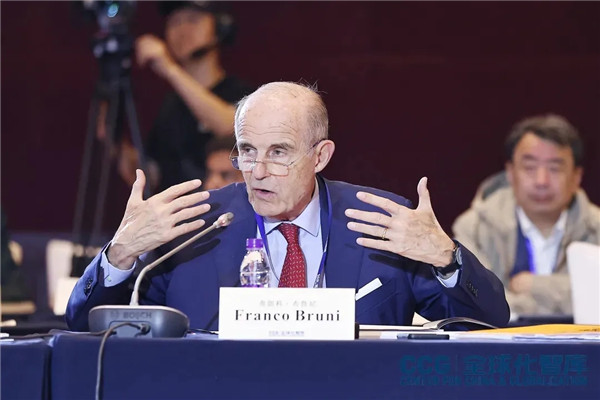
Thank you very much for having me here, and thank you on behalf of ISPI. Well, multilateralism is under attack, obviously, and not only by Trump, and not only today. It has been under attack for a while. The European Union hasn’t been a generous contributor to the strengthening of multilateralism, and neither has China.
I fully support the idea that we have to live through this complex and disordered period, looking for coalitions of the willing, as has been said, to exercise multilateralism in various forms, in various coalitions. I mean, you can change coalitions, but you have to manifest to the world the desire of reconstructing multilateralism in all types of issues. It can be a period of disorder, but it has to be creative in this sense.
Let me make a few examples. Tariffs—well, Trump’s tariffs have been launched with the excuse of macroeconomic imbalances between exports and imports. They are a failure, and they only create disorder. But the problem of macro imbalances is there. Therefore, we could start very soon, with the help of the IMF, a coordinated macro policy effort to solve the main macro imbalances in the right way—that is, by changing the equilibrium between saving and investment, which is what really determines the balance of payments.
In this sense, I think that the U.S. should cut its deficit, or at least not increase it, which would correct its balance of payments with the rest of the world. China should insist on increasing consumption, and this is one of your missions. I understand that also internally, you have this plan. It should be pushed with the support of the international community and the help of international institutions. And the European Union should invest more and better so as to increase its productivity. I mean, these three actions, coordinated in the right fashion, could very much contribute to improving macro imbalances.
Diplomatically, there are several other things to do, including what has been already mentioned—a better involvement of the Global South in proposing reforms to multilateral institutions. Europeans, in this sense, could be the leaders because we do occupy certain multilateral institutions, including the IMF, too much. I mean, we have too many votes in the IMF, and we should give up part of our vote in favour of Global South countries and China. We should also insist, in a nearly hysterical way, on reforming the IMF, which is no longer functioning. This is not only a problem coming from Washington—that certainly creates problems because it dominates the IMF in an unnatural way—but the problem also comes from France and others that do not want to give up their extra power. I will maybe come back to this point this afternoon when we talk about regulations, because reforming the IMF means also entering into financial regulation in general. Thank you.
Henry Huiyao WANG
Thank you, Franco, for your excellent recommendations. Absolutely. I mean, 80 years ago, we established all those institutions of Bretton Woods, but just like a child, the clothing they’re wearing now is growing out of an adult, so we need a new fit. But absolutely, how to reform those multilateral institutions is really a key issue, and I think it’s high time that we tackle those challenges and contribute our think tank consensus there.
Next, I would like to have another guest from the Middle East, Mr. Rashid Al Mohannadi. He’s a Nonresident Fellow at the Middle East Council on Global Affairs. Thank you.
Rashid Al Mohannadi, Nonresident Fellow at the Middle East Council on Global Affairs
Thank you. Ladies and gentlemen, salam alaykum, nihao,
Before I start my remarks, I’d like to address something that happened in the keynote speeches. When Ambassador Zhang suddenly transitioned from Chinese to English, I thought all of those Chinese lessons finally paid off, but unfortunately, no. So, coming back to my remarks, I’d like to start with a question. What happens when the world’s most powerful country no longer believes in the system they helped build? This is not a theoretical question. It’s a reality we are facing today.
We are gathered here at a time of pronounced transition in the international system. The question before us is not about renewing multilateralism but reimagining global governance in a world that no longer operates on the assumptions of yesterday. So the return of Trump 2.0, a second Trump administration, does not only bring a political figure back into power but it brings a worldview. That worldview is transactional, deal-oriented, techno-nationalistic, and distinctly bilateral. It is about making deals, not about building institutions. We’ve already seen this with the historic visits and strategic alignments between the U.S. and key GCC states. We see China negotiating directly with the U.S. on a potential trade deal. We see Europe recalibrating its security architecture. Everyone is lining up to cut their own deal. The multilateral institutions—the WTO, UN, and others—are increasingly sidelined, and frankly, for the next four years at least, it will remain so.
But here is the pivot I would like to suggest. We shouldn’t spend our energy debating Trump 2.0. Trump 2.0 is here. We’re living in it. The more critical question is what the world will look like after Trump 2.0. And my answer is: more regional, not fully bilateral, not fully multilateral, but regionalism as the dominant structure in a multi-polar world. We see this happening today.
Just this month, at the end of this month, the GCC-ASEAN-China summit is happening in Kuala Lumpur. This is a signal of what’s to come: regional blocs acting as poles in a distributed, multinodal global order. Now, can China and the Global South work together to reform the current international institutions? Here I must be blunt. Many of these institutions are toothless. They lack enforcement. They lack political will. And they have repeatedly failed us, especially us in the Global South, on poverty, development, peace. The UN couldn’t stop the Russian-Ukrainian conflict. It couldn’t stop the genocide in Gaza. It couldn’t stop trade wars. So, we must ask not how to fix them, but whether they are really fixable. I remain sceptical.
Instead, I look at regional organisations not as perfect models, but as effective ones. The GCC, ASEAN, and others—these organisations are not flawless, but they’ve delivered on security, economic integration, and dispute resolution in ways global institutions have not. This brings me to the future, the model of inclusive multilateralism. We need regional multilateralism—regional organisations delivering regional solutions. It’s what I like to reluctantly call “glocalisation”. The reason I’m reluctant is because I first heard it from a partner at a global consultancy firm I will not name. But the concept is sound: global coordination through local delivery. The world doesn’t need a one-size-fits-all governance model. It needs many models connected and collaborating.
We need to rewire the global system from the ground up using the logic of networks, not empires. Regional organisations must become primary nodes in this network. And the great powers, mainly China and the U.S., must begin to see ASEAN, the GCC, and the African Union not as spectators but as strategic actors. We are not entering a post-globalisation world. We are entering a world of regionalised globalisation. And if we want legitimacy, equity, and effectiveness in our governance frameworks, we must build them from the regions outwards and not the other way around.
We are entering an era of what I like to call the era of global bridge cities like Doha. This is because these cities bridge the global nodes. And I’d like also to remind everybody, in 2001, Doha was the site where China entered the WTO, which allowed China to realise its economic potential and for countries, especially in the Global South, to reap the benefit of China reaching its economic potential. So thank you and xie xie.
Henry Huiyao WANG
Great. Thank you, Rashid. Excellent input. You invented the term “glocalisation,” global localisation. That’s probably the new trend in terms of how this 2.0 of Trump and how we talk about this panel. This roundtable is about enhancing, improving, and enlarging the multilateral system. So, by involving regionalism like RCEP, GCC, ASEAN, China, and many more, I would think that’s probably the best way to weather this unilateralism that is sweeping around the world. And strengthening regionalism and “glocalisation” is probably the way going forward. Thank you very much. I know you talked about Doha. Doha now has such a big soft power, you know, mediating many geopolitical conflicts. Also, you have a Doha Forum, which is one of the largest forums in the world, well recognised. So, thank you.
Now I’d like to invite Madam CHEN Wenling. Madam Chen is a well-known scholar in China. She was also the former Chief Economist of the China Centre for International Economic Exchanges (CCIEE), which is a well-known think tank in China. Also, she’s a Senior Academic Council Member of CCG. Before the CCIEE, she was the Director-General of the State Council Research Office for a number of years. So, Madam Chen, please.
CHEN Wenling, Former Chief Economist, China Center for International Economic Exchanges (CCIEE); Expert, CCG Academic Council
[Speaking in Chinese]
Thank you very much to CCG for organising such a forum. We’ve had the privilege of hearing insightful perspectives from experts, scholars, and leaders from both China and around the world. I would like to take this valuable opportunity to share three points.
First, what are the real challenges facing multilateralism today? The post-Cold War international system has effectively come to an end. Unipolar hegemony, once dominant, is now in decline. But paradoxically, it is in precisely this moment of transition that we are confronted with even more severe challenges. Some major powers, particularly those with dominant positions in the global economy—and I won’t focus too much on Trump specifically, as he’s already been discussed at length and I don’t think we should elevate his stature further—these dominant or hegemonic powers have increasingly resorted to bullying and coercion. A striking example is the imposition of reciprocal tariffs announced on April 2, with plans to launch tariff wars against as many as 185 trading partners. This tariff war is also highly unstable, fluctuating wildly with no consistent direction. The tariff measures are often swayed by fluctuations in the U.S. stock market, the temperament of the U.S. leadership, and international sanctions. If this trend continues, it may eventually lead to a collapse.
Second, another major challenge is the resurgence of imperial thinking among hegemonic powers. These countries are attempting to revive expansionist agendas, seeking to extend their influence, engaging in deals to mutually redraw boundaries, and carve out new spheres of control. In doing so, they treat small and medium-sized countries, especially developing nations, as insignificant or expendable, with little regard for the principles of equality. This trend is becoming increasingly evident.
Third, certain hegemonic powers have begun to directly challenge the post–World War II international order. They are undermining the authority of multilateral institutions such as the United Nations and the WTO. The United States—coming back to it—has withdrawn from 15 international organisations and has even suspended its financial contributions to the WTO. As President Henry Huiyao Wang just mentioned, China has contributed 500 million U.S. dollars to the WTO, which stands in stark contrast to the United States’ withdrawal of support.
Fourth, certain hegemonic powers have instigated multiple wars around the world. They are hidden orchestrators, ignitors, and profiteers who benefit from war. Their actions have made the global landscape increasingly complex and volatile amidst the war.
Fifth, many countries are grappling with severe internal crises, including racial tensions, widening income inequality, deep political rivalry between parties, as well as mounting debt, inflation, and energy crises. These nations are, in effect, seriously ill. Yet instead of addressing their illness domestically, they externalise their crises and force the rest of the world to bear the consequences. This has posed an enormously severe challenge to multilateralism today.
My second point is that economic globalisation is facing profound challenges.
First, the global systems of trade, investment, currency, logistics, industrial and supply chains, as well as energy, are all under severe strain. Second, the technological revolution has brought about disruptive, historic, and explosive transformations. The technological pathways of China and the United States have already diverged. In the U.S., innovation is increasingly driven by and serving the virtual economy, resulting in a highly virtualised economic structure. Moreover, American technological advances are often directed towards war and global control. In contrast, China’s technological revolution is more focused on empowering the real economy. Integrating with manufacturing, it has fostered advanced productive forces, intelligent ecosystems, and breakthrough innovations, including “zero to one” technological achievements. I believe this technological divergence may shape the trajectory of technological evolution in not only the two countries but also the world.
Third, certain hegemonic powers have begun to disregard global laws and international rules. They place their own national interests, rights, and legal frameworks above those of other nations and the global community. This tendency has become increasingly extreme. The United States, in particular, has transformed its domestic laws into global laws, frequently using them as tools to impose a wide range of sanctions across the world.
Fourth, widespread politicisation, securitisation, and polarisation of global affairs have exerted a profoundly negative impact on the world economy.
I’ve shared two points, and now I would like to offer a few brief recommendations: First, the international community should reach a consensus to construct a new system of global governance that is flexible, resilient, and sustainable—one that upholds the principles of fairness, justice, openness, and transparency.
Second, every effort should be made to safeguard the authority and functioning of international organisations, enabling them to play a greater role in global affairs, rather than allowing hegemonic powers to dictate the rules.
Third, it is essential to support multilateral institutions and platforms such as the G20 and the BRICS mechanism.
Fourth, China should continue to focus on its own affairs by advancing Chinese modernisation while also pursuing more open policies. As Huiyao just mentioned, China has implemented unilateral zero-tariff policies for 43 least developed countries. In addition, China has expanded its visa-free entry policies from 72 hours to 144 hours, and now to 280 hours, with entry permitted through 60 ports of entry. These are just some examples of China’s opening-up policies. In conclusion, I have taken this valuable opportunity to discuss two key points regarding multilateralism and globalisation. Thank you.
Henry Huiyao WANG
Thank you, Madam Chen, for your excellent remarks. Absolutely, I think we need to maintain the existing global order that we’ve been celebrating. Of course, we have to improve, enhance, and enlarge it rather than divide it into bipolar multilateralism. We need one multilateralism, but one that is more inclusive. Also, we need to really have more participation from the Global South.
Now I’d like to have another chief economist, Fabian Zuleeg. He’s the President of the European Policy Centre (EPC), a very prestigious think tank based in Brussels. Also, the EPC has been a partner with CCG for the last five years under the China-EU Think Tank Exchange program. You have been in China quite a number of times now. So, Fabian, we’d like to hear from you.
Fabian Zuleeg, Chief Executive and Chief Economist, European Policy Centre (EPC)
Thank you very much. I’m very happy to be here, and particularly happy, actually, to be in this session on global governance and multilateralism. Because I think this is one of the defining issues of our time. But to really get to a solution, I think we have to start with a common understanding of what we actually mean by multilateralism. And it strikes me that when I hear the discussion, it’s not necessarily the same understanding of what multilateralism should mean.
I’m speaking very much from a European perspective here, because Europe has been very strongly committed to multilateralism for the last decades. In fact, the European Union is, in essence, the embodiment of multilateral principles. So we very much understand how multilateralism can work. But of course, we also understand that multilateralism has to change, that the global governance we have at this moment in time is not fit for the time we’re living in. There have been many changes—the rise of climate change, for example, the changes in globalisation we have seen, and certainly, also the right demand from many countries around the world for a fairer and a more inclusive system.
But we are also living at an age where there are countries, leaders, who want to destroy the multilateral system, or those who undermine the multilateral system by the actions they are taking, for example, weaponising interdependence, using economic means to achieve political goals.
So, for me, what is at the heart of multilateralism? It is a rules-based order. A rules-based order where rules apply to everybody, regardless of differences in power, differences in size, differences in political system, where power and superpower is mitigated and channelled for the common good, to address common challenges such as climate change and sustainable economic development. Multilateralism means a consistent adherence to common principles, such as those embodied in the UN Charter—principles such as the protection of territorial integrity, of sovereignty, protection from wars of aggression from any side.
It is clear that the world has become multipolar, but that does not create multilateralism automatically. Multipolarity is not an ordering principle. Only if the multiple poles are adhering to common principles, to common rules, to submit to common authority, can we really achieve better governance. That is precisely the lesson we had to learn in Europe, where the strongest and the weakest are bound together by a set of common rules, accepting that we have to make difficult compromises for the common good. In the absence of common rules, we live in a world where might is right; in a world of conflict, where the global commons are not protected, where we have predatory trade, where the small and the weak suffer, and where there is chaos, not order—anarchy, not multilateralism.
As stated at the outset, Europe is very committed to multilateralism as THE ordering principle of global governance. But that means reform. It means working together, having common action to prevent a world of fragmentation, of instability, and the uncontrolled exercise of power.
So, very much looking forward to working with the global community, which is committed to multilateralism as the ordering principle, so that we can achieve an effective multilateral global governance. Thank you.
Henry Huiyao WANG
Thank you, Fabian. Absolutely, I think we are getting into a multipolar world, but we don’t have a multilateral system to support that transition. I don’t know how long it’s going to be, but absolutely, we need to build up the consensus and work together by all nations, particularly those major countries that should set a good example.
Now, I’d like to have my friend Loukas Tsoukalis. You are the President of the Board of the Hellenic Foundation for European and Foreign Policy (ELIAMEP). I also know you are a Professor at Sciences Po too. So great to have you. Your input, please.
Loukas Tsoukalis, President of the Board of the Hellenic Foundation for European and Foreign Policy (ELIAMEP)
Thank you very much. You have invited us to reflect on how to renew global governance and multilateralism in uncertain times, and I think it’s more than uncertain times. To be frank, we live through the end of an era, and we know what the era that is leaving us behind looked like. We are not yet at all sure what the new era will look like, and the intermediate phase may be long and can also be extremely dangerous.
The signs of the end of an era preceded the return of Mr. Donald Trump to power. And let us remind ourselves very briefly what the old era looked like. It had, I believe, three main features. One was unipolarity or undisputed U.S. hegemony. The second was globalisation in its liberal or perhaps neoliberal economic version. And the third was the integration of China into the global capitalist system. All those three things were happening against the background of ongoing technological change, which was dramatic, technological change that was changing rapidly our economies, our societies, and the way we live every day, and also against the background of a growing existential challenge facing the whole of humankind, namely, climate change.
Now, changes, as I’ve already argued, have preceded the return of Mr. Donald Trump. We’ve been witnessing for some years the dispersion of power, the end of unipolarity, although the U.S. is likely to remain for quite some time the most powerful country in political, economic, and military terms. We’ve been experiencing also, because of the geopolitical shifts, the return of security considerations taking precedence over economic efficiency concerns. And that in turn affects globalisation because if people put an emphasis on security as opposed to economic efficiency, this is bound to affect the process of economic globalisation.
Furthermore, there was something else, and this was that economic globalisation produced many benefits, but benefits were very unequally distributed, especially within the developed world, which is increasingly challenging the process of globalisation. And last but not least, we’ve been asking more and more for the revision of rules to deepen economic interaction between very different systems, both economic and political systems.
Now, let me end by saying a few words about what could be Europe’s contribution to the remaking of the international system. Now, Europe’s contribution inevitably will be a function of the key distinguishing features of Europe and its historical baggage. Let me again summarise the likely European contribution in three main elements.
The first is that, as we all know, Europe has been engaged for several decades in what I consider to be a revolutionary political project, which is European integration, and which is meant to establish peace, open borders, and share sovereignty among countries that invented national sovereignty in the first place. And we’ve been doing that through common institutions, common rules, long dialogue, and compromise. And this is precisely the things that ideally, Europe should contribute to the remaking of the international system, namely, dialogue, compromise, institutions, and rules. Furthermore, for you not to worry too much, Europeans are not coming back as missionaries. They combine a missionary approach with a more realistic view of global politics, which I welcome.
The second feature of Europe is that Europeans have open economies, and because they have open economies, they treasure economic interdependence, but as long as economic interdependence is governed by rules, and rules that are considered to be fair by everybody, and rules that do not allow too much of free riding by whoever.
And the last point I would like to make is that Europe has been a pioneer in the provision of public goods, and Europe will continue to be a pioneer in the provision of public goods, and most notably, the provision of a liveable environment. So, [in] the fight against climate change, one should expect Europeans to be among the leaders. Thank you very much.
Henry Huiyao WANG
Thank you, Lucas. Good point. Absolutely. I think Europe is the biggest peace project we are able to see in modern times. And now, more strategic autonomy needs to be encouraged after this conflict in Europe, with Ukraine and Russia. So, we hope that the trilateral relationship between the U.S., China, and the EU could be more independent and more cooperative.
Next, I would like to have President Sun Jisheng. She’s the Vice President of China Foreign Affairs University (CFAU). China Foreign Affairs University is very prestigious in China and probably has trained over 500 Chinese ambassadors in the last 60, 70 years. It is very, very prestigious. So, we’re very fortunate to have President Sun join us. We’d like to hear from you, President, please.
SUN Jisheng, Vice President, China Foreign Affairs University (CFAU)
Thank you, Henry, for the introduction and thank CCG for the invitation. We have discussed quite a lot about multilateralism and global governance. Definitely, multilateralism is undergoing profound changes, and global governance is facing severe challenges. So I’ll talk about why and how to move forward.
Why? Probably three observations. Number one, the foundation on which multilateralism operates has changed greatly with the change of distribution of power. Of course, the direct result is the narrowing gap between the developing countries and the developed countries and also the narrowing gap between China and the U.S.
What about the influence? Actually, the change of distribution of power also influences countries’ self-perception, mutual perception, and perception towards the international order and international system. Then we see the difficulty of reaching consensus, the hesitation or even unwillingness to cooperate, the increase of misperception and misunderstanding, and then the lack of mutual trust. More importantly, we see the increase of geopolitical competition and the high-profile return of traditional security threats in the world agenda, which severely threaten the stability and effectiveness of the current international order.
So this is the first reason. The second reason is, facing all the above changes, the international institutions and international rules and norms, etc., on which multilateralism and global governance rely all the time, have not kept pace with all these changes. They are regarded as inefficient, ineffective, and even failure, no matter whether to deal with financial crisis, COVID-19, or the current crisis in Ukraine or Gaza, and so forth.
Of course, the third reason comes from the choice of the US, which actually produces a long-lasting positive effect, especially from the attitudinal perspective. For instance, the United States is actually not willing to provide public goods anymore. Then the attitudes towards globalisation also changed. Then, the attitudes towards international organisations and international rules and norms also changed. So that severely damages the spirit of the contract. They actually greatly influence a very severe result, that is, it influences international cooperation. Then people began to worry more about unilateralism, power politics, or even the law of the jungle.
What about the future? How to move forward? I think, number one, facing these instabilities and challenges, we do need to address perception and attitudes. We should establish proper perception towards this world, especially for major countries, because Chinese Leader always emphasises that big countries or major countries should behave or should do as major countries. Especially for global governance, no country can deal with global issues alone, no matter how powerful you are.
The second point is we do need to strengthen institutional building, because institutions, no matter for multilateralism or for global governance, are extremely important. So institutional building relies on twofold. One is to reform the current institutions—of course, we mentioned the UN and also the other UN special agencies and so on and so forth. But now it’s extremely important because of the competition among major countries. When we mention institutional building, another thing we can do is to turn more to regional institutional building, such as African countries or Asian countries and so on and so forth. So in this fragmented world, regional institutional building is more important and probably can play better roles.
Another focus we can turn to is specific issue areas because we face so many different kinds of global problems, and different countries have different concerns and worries. Probably, using one specific issue area can link more countries together. Of course, meanwhile, we also need to provide tangible support to these international organisations or institutions. Last year, when I visited the UN headquarters in Geneva, I was told that in order to reduce the cost, they even reduced the number of guards or shut off the elevators to save electricity or even adjusted the temperature of the air conditioner. So they really lack financial support.
Last but not least, we are having this forum in CCG, a well-known think tank. I think think tanks can also play a better role in this digital and AI world because now we are also facing the collision and competition of different narratives, misinformation, and disinformation. So probably, think tanks can play a better role to better educate the public, to better shape public opinion, so as to make people better understand what is the most important thing and the right things for the world to make an effort for. I’ll stop here. Thank you.
Henry Huiyao WANG
Thank you, President Sun. Excellent points. I know that China Foreign Affairs University is under the Ministry of Foreign Affairs. You’ve trained a lot of future Chinese diplomatic leaders. So, thank you for your contribution.
I’d like to have our friend from the Delphi Economic Forum, Konstantinos Tsalakos, the head of content at Delphi Economic Forum. By the way, the Delphi Economic Forum is also one of the largest forums in Greece and is very successfully run. So we’d like to hear from you, please.
Konstantinos Tsalakos, Head of Content, Delphi Economic Forum
Thank you very much for the invitation and the kind words. So, allow me to share some thoughts on the implications of the current U.S. administration’s stance for multilateralism and global governance.
The current U.S. administration represents an ideological paradigm shift in the way the U.S. approached internationalism in the last 35 years. The main thread of this shift is the reversal of the post-Cold War assumption that the U.S. significantly benefits from a system of predictable and consistent global rules and institutions. The whole nexus of the latter is no longer viewed as the expression of a conscious self-limitation of power in the name of overriding values, neither as an instrument of soft power, as the late Joseph Nye would say, but as mechanisms of expropriation of American dominance and prosperity.
There seems to be a structural antithesis between the America First logic and the logic of multilateralism. The latter needs time to bear fruit, presupposes the readiness to make compromises of self-interested sovereignty, as well as considerable funding transfer from wealthier to less wealthy states. None of this seems compatible with the America First ideology.
To be sure, how the West understood its commitment to multilateralism has always been open to interpretation. But the implementation of an openly transactional approach by the current U.S. administration that uses multilateralism when it serve its interests, exits or blocks multilateralism when it does not, replacing it with unilateral action and bilateral agreements, or bargains participation to extract concessions from allies and partners, hugely undermines the trust in the systems of efficiency and opens the door for other willing parties to withdraw from rules, commitments, restrictions.
But if we want to assess the consequences of this development, we must be sincere about its sources. The current U.S. administration is the symptom of the problem, not the cause. The latter relates to a broader and longtime coming crisis of the idea that the world could share some common values. This is due to the fact that the globalisation paradigm failed in some aspects to deliver its promise. On the one hand, we’re talking about the systems, certain institutions of which were set up during the age of the end of European colonialism, reflecting imbalances of power and injustices mostly at the detriment of the Global South and East.
On the other hand, in the West, the system’s emphasis on financialisation created immense inequalities of wealth domestically. The result is that even before the current U.S. administration, and despite the considerable contributions to tackle global problems, forms of global governance were seen as embedded in a kind of metapolitics. The former structures were there, but their substantial meaning was emptied out. They were looking like empty shells. So the new U.S. administration accelerated and actually imploded this whole process of fragmentation and delegitimisation.
Now the main issue for the supporters of international cooperation—and I’m speaking here from a European perspective—is how can we legitimise structures of global governance and multilateralism, since despite the fragmentation, contemporary issues require more than ever cooperation. To tackle this, I think that we must answer two crucial questions. First, is it sufficient to restore the previous system as it was? And second, can the system work without the participation of one major stakeholder or the commitment of all parties to democratic procedures and respect of rules? The realists should answer in the negative to both. But this means that even if we aim for a reformed multilateralism, stronger and more equitable, we should prepare ourselves for a different outcome—a normatively thinner or limited sector-based international cooperation.
Let me explain myself. Reinforcing multilateralism today presupposes defending the idea of common values and rules but reimagining its structures, differentiating them both from the isolationist pre-war paradigm and the hyper-globalist one of the 90s, allowing paradigms of social and global justice to emerge. This is, however, an almost utopian task given the present ideological and geopolitical divides.
But since specific global problems are more pressing than ever, one should experiment with different strategies, including working with or giving some consensus in areas where a stakeholder’s commitment is vital; working in some public goods without a major stakeholder, even forming coalitions of the willing—not to create solidified new blocs, but with the aim of strengthening or reforming international institutions or introducing new methods to improve multilateral work. Undeniably, this new setting places a huge burden on middle- and low-power countries that must navigate themselves in a very difficult power-based environment.
Now, speaking again from a European point of view, the EU, both as a regulatory and a democratic rule-abiding power, could have a huge role to play in this transitory setting. Time will tell if it will be up for the challenge. Thank you.
Henry Huiyao WANG
Thank you, Konstantinos, for your good comment as well. We absolutely need to figure out how to reform this challenging world, and how we can work together is crucial, particularly given the lack of incentive from some countries right now. We need to work together.
Now, I’d like to invite Youness Zangiabadi, the Executive Director of the Institute for Peace and Diplomacy (IPD) from Canada. We know that Canada just got a new Prime Minister, and we hope that China-Canada relations can be improved, like we did with Australia. So, Youness, your turn, please.
Youness Zangiabadi, Executive Director, Institute for Peace & Diplomacy (IPD), Canada
Thank you very much, Henry, for the kind introduction. It’s also a great privilege and honour to be amongst distinguished speakers and panellists. I’m also happy to be representing a voice from Canada, a country that I believe many of you have seen in the news just since the beginning of this year, as opposed to the past decade, given what we’re experiencing with President Trump.
As for my speech, what I’ve done is to I have organised it into three interrelated segments: starting with framing the geopolitical order and highlighting the increasingly important [role] of interest-based thinking and pragmatism within foreign policy discourse and strategic circles, especially in the West and Canada, which I can speak for as well. Then, I’ll speak to the shifts that we see in this new order, especially how multilateralism is now conducted these days as opposed to the past, and how we can best utilise that moving forward, at least in the short term. Finally, I’ll try to present some practical approaches and methodologies that can be utilised by major powers and in coordination with middle powers, as well as smaller ones, to address the challenges and opportunities that we are faced with within this new world order. So let me get through these as quickly as possible.
The first segment is easy, as we all know—I think there’s almost a global consensus—that we’ve moved on from this unipolar moment where we had the U.S. as a global hegemon, to more of a multipolar moment, where we have great powers such as China, Russia, as well as middle powers, challenging the longstanding institutions, conventions, as well as norms championed by the U.S.
It’s important to understand that within this more multipolar moment or order, there are two important shifts that are happening, in particular with respect to how countries are rethinking and crafting their foreign policy in the West. And again, I can speak for Canada here, many countries, especially after the return of President Trump to the White House, are moving away from this values-driven and globalist agenda in their foreign policy. Their foreign policy discourse is now very much defined by interest and pragmatism, which wasn’t the case even during Trump’s first presidential term. Having our Canadian prime minister, as Henry mentioned, Mark Carney, saying that our old relationship with the U.S. is over is huge both within Canadian political discourse as well as the Western world overall.
The second shift that we see is with respect to how states are increasingly interested in conducting multilateralism, which is now true minilateralism rather than global and large multilateral institution- or coalition-building approaches. That’s because there is a realisation that growing internal divisions within these large multilateral institutions hinder taking effective measures to address the challenges that we face today.
Finally, let me share my humble suggestions on some of the practical approaches that can be utilised for multilateral cooperation, especially by great powers, that can later facilitate broader multilateral cooperation, including other countries as well.
To do that, first and foremost, it’s crucial for major powers to acknowledge that the strategic competition is going to be with us here for the foreseeable future. However, at the same time, there should also be a commitment to making an effort to compartmentalise foreign policy challenges and identify areas of collaboration to address mutual challenges of common interest. This can be done case by case on smaller issues to build trust along the way for more comprehensive and multilateral cooperation. One example that can be highlighted as a potential of this approach being practical is the Saudi-Iran normalisation brokered by China, which we know for a fact that it was greenlighted and supported by the United States.
Imagine if there was a multilateral mechanism in place, however small, through a minilateral format, that would have allowed such cooperation to happen sooner, which would have been beneficial both for the region and the international community.
There are also other areas where cooperation can take place—from maritime security to nuclear non-proliferation as well as climate change—but that requires compartmentalisation of challenges between great powers as well as others.
In conclusion, I would say multilateralism will be there, but it will not be as large and globalised as it used to be, especially in practice, and it will be multilateralism through various groupings focused on specific issues that will be the dominant trend until we see proper structural reforms and new global institutions that can be more inclusive, effective, and trusted. Thank you.
Henry Huiyao WANG
Thank you, Secretary Youness. I think absolutely, Canada is one of the strong forces in the multilateral system, and China and Canada really work together to continue to safeguard free trade and multilateralism. So, thank you for your point from Canada.
Now, we probably run out of time to finish all the participants, but I’d like to have a final round with the morning opening remarks speakers and the keynote speakers—just briefly give you three minutes, probably, for a final observation and intervention. So, maybe I’ll start with James Chau, the President of China-United States Exchange Foundation (CUSEF). Why don’t you start first, James?
James Chau, President, China-United States Exchange Foundation (CUSEF); Goodwill Ambassador, World Health Organisation
Thanks very much, Henry. Just three very quick points. I mean, obviously, I think a lot of the range of points that have come up today are very useful, and I wanted to drop in on a few.
The first one being the intensifying U.S.-China technology competition, especially in AI and quantum computing. That risks fragmenting global technological ecosystems into what I think will be incompatible blocs, which undermines multilateral collaboration on critical issues, not only on AI safety ethics but also governance. And I think that the boiling point that this will then create is a growing strategic risk and threatening global stability unless these two countries can engage in urgent diplomatic efforts to establish shared international norms and regulatory frameworks.
How that actually happens, I’m not quite sure, and I think that many people have pointed out or alluded to the fast shifting sands where it’s so hard to make accurate predictions. I mean, nothing is fail-safe. Everything, there is a calculated risk involved. But I think we’ve walked into this environment where the conditions are so unstable in a way globally, but also almost like a knee-jerk reaction, flitting here and there, which makes it all the more difficult.
My second point is that reforming multilateralism for the 21st century, I think, will involve enhancing inclusiveness, legitimacy, and robustness of global institutions—the very ones that are under threat right now. I mean, I’m Chinese but I grew up in England, and we benefited very much in that environment from those robust institutions, but even there, there’s a big question mark too. So I think why that’s important is that we need to address the inequalities, which is what the President of Asia Society brought up: that globalisation, for all its goodness, has also given way to this enormous wealth divide, which I think here in China, they’re trying very hard to avert what we’re seeing elsewhere in other developed countries.
So, addressing inequalities but also accommodating diverse interests while also preventing nationalist fragmentation, which is what the former Foreign Minister from Australia spoke about in terms of nationalism. We’ve been seeing this trend for well over a decade now, where this narrowing space has been created by this rising trend towards populism. And this inward thinking that comes out of this island mentality has been one of the resulting factors of this trend.
So in sum, I think renewing global governance and multilateralism amid the uncertainty that we’ve spoken of critically depends on managing U.S.-China relations, balancing competition with cooperation, and reforming institutions—which has come up again so many times—to be more inclusive, legitimate, and effective in addressing transnational challenges.
And just one thought to finish off with: I don’t come from a U.S.-China background. I come from a background, well, in this space at least, closely tied to HIV and AIDS. And I think that HIV and AIDS, which is one of the areas which is under severe threat now with the state of execution hanging over the PEPFAR program in the United States, but also a big question mark over foreign aid everywhere around the world or in many places around the world. That very successful approach to HIV and AIDS offers a really good playbook. I mean, China used it very well, Australia used it very well as well, where you allow political leadership to freely combine with science and civil society.
I think where that’s relevant to renewing global governance today is where you do allow more actors to come into the space. And I think at a time when so many governments are being voted in and out every four years or they’re changing—there was a period in the UK where they changed very rapidly after 30 or 50 days or something—we need more stable actors to be working with government. And I think that also speaks to many of the points that people have brought up here today. Thanks very much.
Henry Huiyao WANG
Thank you, James. Now I’d like to have Ambassador Declan, Chairman of EPC, just briefly, just a few words to say.
Declan Kelleher, Chair, Governing Board, European Policy Centre; Former Irish Ambassador to China
Thank you very much, Henry. First of all, I think this has been an extremely good session. I think all of the contributors made very rich and very valuable points. I would just very briefly focus on four quick aspects.
Number one, multilateralism is clearly of great importance to everyone around the table. But it is important to be clear as to what multilateralism means. And also, we need to be clear that multilateralism needs to be effective. It needs to be operationalised and operational multilateralism.
Secondly, I was very struck by the reference to the role of regional organisations. Clearly, two obvious consequences of a greater focus on regional organisations are how they combine and how they cooperate both at the regional and at the super-regional level.
Third, I think it is important to ensure that in an era now where we have a deadening effect of a tariffs culture, trade and international economic cooperation is sufficiently vibrant to counteract that deadening effect. That’s why, for example, the European Union is now very actively seeking to both complete certain trade agreements, certainly with Latin America, Mercosur, with Canada, with CETA, and also is reaching out to other countries all around the world and other organisations to try and warm up trade negotiations. I think that’s a very important counterbalance to the deadening effect of the growth of the tariffs culture.
And finally, and it’s an important point, the reform of the UN institutions. That’s absolutely right. I just recall that the rules of procedure of the Security Council, I think, are still provisional. And the Security Council was created in 1945. So I think there are general arguments and important arguments that the UN institutions need to be looked at, need to be reformed, need to be made, as has been said, fit for purpose for the new era. Thank you, Henry.
Henry Huiyao WANG
Thank you, Ambassador Declan, and now I want to give the final words to Secretary General, Minister Zhang Jun, for your concluding remarks.
ZHANG Jun, Secretary General, Boao Forum for Asia; Former Permanent Representative of China to the UN
Thank you, Henry. Actually, I have laid out what I wished to say at the beginning of this session, but I do find the discussions very much interesting. And I was very much impressed by what I heard from the guest speakers from different perspectives. With your permission, I wish to emphasise the following points.
First, while many things are happening in the world and we have heard a lot about uncertainties we are confronted with, I think what we really need to be more vigilant about is that we do our best jointly, globally, to prevent the worst from happening. I’m not exaggerating the situation we are facing today, but you have all mentioned the failure of the international institutions, including security and peace institutions, including economic and financial institutions.
You have mentioned the severe situations in the Middle East, in Europe, and in other parts of the world. That shows clearly that if the current international institutions continue to fail to function, definitely, there will be some vacuum left, and then some troublemakers will make use of those vacuums and create more problems. If big countries fail to work closely with each other, definitely, all the rules will not be abided by, and all the institutions will not work well, like the Security Council of the United Nations.
Even though we do not have the intention to have another Third World War—I mean, from the huge majority of the world—accidentally, the world might be dragged into a larger regional, even including a financial war or a global trade war. I’m not pessimistic, but we have to be prepared for the worst and then try our best to prevent the worst from happening.
Secondly, we have talked a lot about global governance, and, of course, we hope that all the good things will happen, but in my personal view, and in the foreseeable future, what we will have to see is still a transition of global governance. In particular, after the trade war, the tariff war, we will have more evidence to show that the world order is entering a transitional period of time.
With that, first, of course, the current international institutions will continue to be defended. We all talked about multilateralism. And then based on that, we will defend the UN, we will defend multilateral institutions. But meanwhile, we have also mentioned that they are not functioning well, so we have to reform.
I wish to, based on my nine-year working period in the Security Council, [say] no reform will be easily realised or easily done simply because it’s not that simple, and also simply because all the decisions concerning reform have to go through the approval of those who are sitting in the chair controlling the power and the decision. Even though it’s provisional rules or procedure, those procedures are in the hands of those holding the power. So it won’t easily go through that way.
Also, [as] Minister Downer mentioned, this reform of the Security Council, because of the nature of the reform, is not that easy. It’s not a simple mathematical game, simply adding one or two numbers. It’s really something fundamentally concerning the peace and security of the world. So we have to make sure that it’s moving forward instead of moving backward. We have to make sure that it makes the Security Council work more effectively instead of making one decision after three days’ discussion. That doesn’t work. Only with 15 members, it’s not working well. If you have 25, it will be even easier. And we have to make sure that all the major countries and middle-sized countries are also sitting there with us, making sure our decisions are fairer and more justified. In that sense, China firmly supports having more developing countries sitting in the Security Council. That’s the basic position of China.
So while we defend the institutions and try our best to reform, I think what’s also happening—I think Mr. Bandow mentioned that—the creation of new institutions is going on. I think that will continue to develop, like what’s happening in the Asian part of the world: the establishment of the AIIB and also the establishment of the BRICS and the New Development Bank. Whether these standing institutions work or not, more institutions will be in place to catch up with the fundamental changes of the general landscape of the world.
And third, judging from what I have seen from Asia, I think the current situation, including the tariff war, will give more pressure for regional countries to strengthen their regional arrangements, including economic integration and regional frameworks on currency, on payment, on connectivity, on communications, on transformations. All those things will be further strengthened through regional and bilateral arrangements. So, with the missing of multilateral solutions, I believe that more solutions will come up from regional joint efforts in the coming days.
And my last point is that while the world is behaving like this, it gives more obligations to think tanks. I think for think tanks, we are not decision makers, but we do have a very important role to play. First, we need to tell decision makers whatever objectives they set from their national perspective, they need that international dimension. They need a good international environment. Without a good international environment, no goals, no objectives will be realised.
Second, we need to tell the world through our academic studies—that’s what BFA is doing—that the world is really changing. You may like the world going back to the Cold War Era or 50 years ago, but the reality is that the world is changing. You have to adopt a mindset catching up with the profound changes of the world.
And third, for think tanks, while politicians are adopting or making decisions based on their national perspective, I think for think tanks, we are the ones to adopt a broader mindset, and not simply based on my national perspective, European perspective, Asian perspective. We do need to come up with some joint solutions based on joint perspectives. That’s what I wish to add. Thank you so much. I hope I did not delay the launch of the lunch.
Past Forums
CCG Holds 11th China and Globalization Forum
CCG Holds 10th China and Globalization Forum
CCG Holds 9th China and Globalization Forum
CCG Holds 8th China and Globalization Forum
CCG Holds 7th China and Globalization Forum
CCG holds 6th China and Globalization Forum
CCG holds 5th China and Globalization Forum
CCG holds 4th China and Globalization Forum
CCG holds 3rd China and Globalization Forum
CCG holds 2nd China and Globalization Forum
CCG holds 1st China and Globalization Forum
